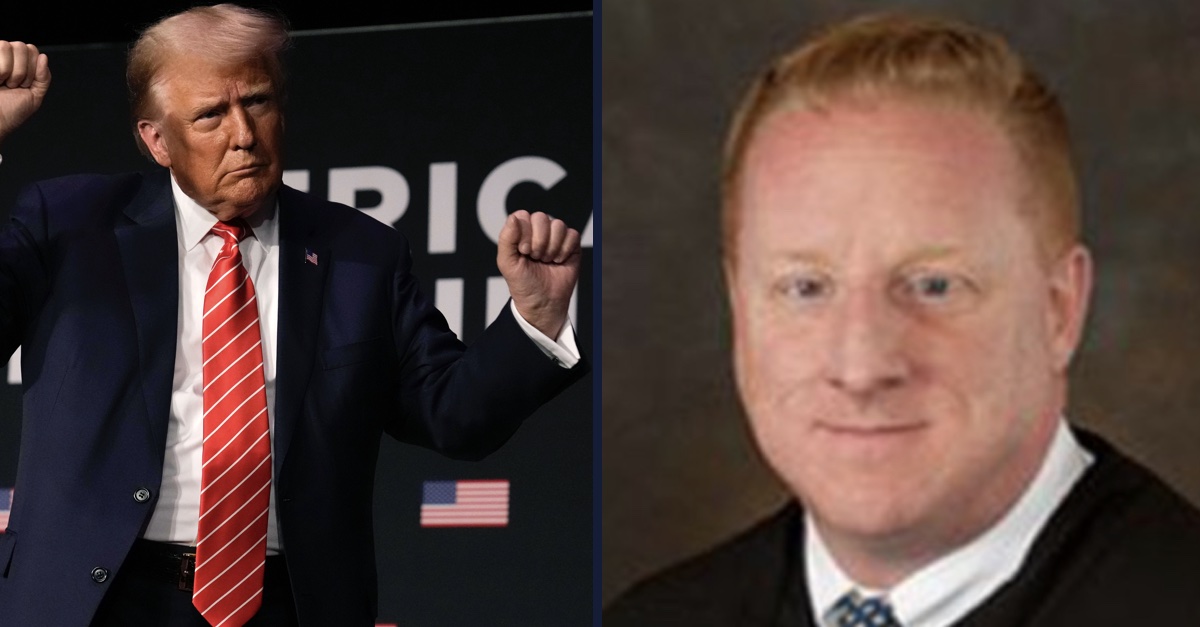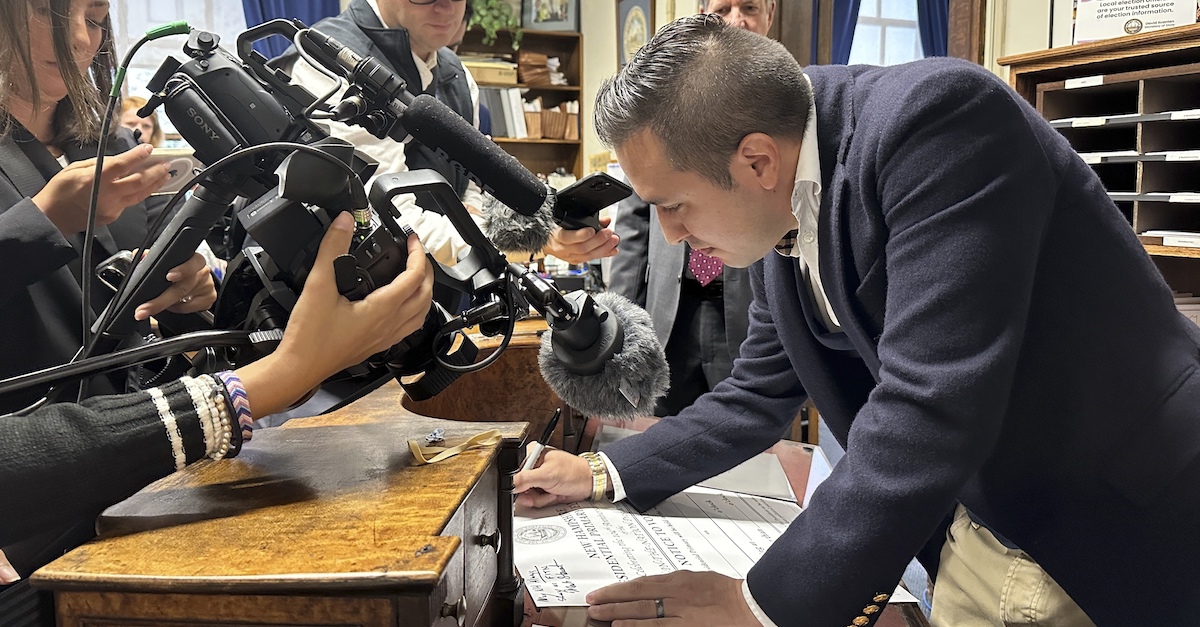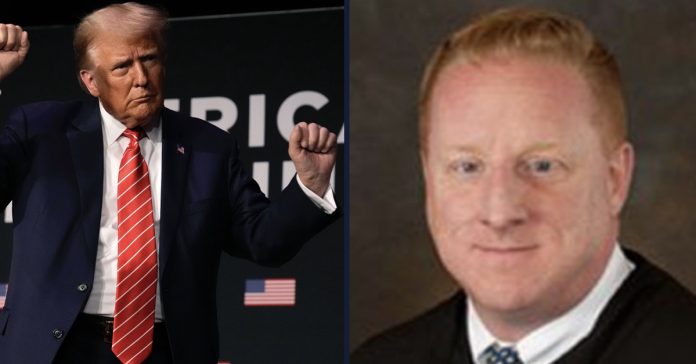
Former President Donald Trump dances on stage during a commit to caucus rally, Sunday, Oct. 29, 2023, in Sioux City, Iowa. (AP Photo/Charlie Neibergall), Judge Joseph Laplante (court photo)
As a Colorado lawsuit to remove Donald Trump from the 2024 ballot citing the insurrection clause of the 14th Amendment heads to trial, and as a similar case careens towards Minnesota’s high court, a New Hampshire challenge has been dismissed for lack of standing.
But the federal judge who tossed the case also wrote that even if the Texas-based tax attorney running for president as a Republican who brought the action had standing to sue, the judge was “inclined to find, consistent with the weight of authority,” that John Anthony Castro’s claim “raises a nonjusticiable political question.”
U.S. District Judge Joseph Laplante, referring to the Supreme Court’s political question doctrine, wrote that, in his view, Donald Trump’s “eligibility to run for and serve as president” is a political question he is barred from adjudicating in the suit filed against New Hampshire Secretary of State David M. Scanlan (R) and Trump.
“In sum, the vast weight of authority has held that the Constitution commits to Congress and the electors the responsibility of determining matters of presidential candidates’ qualifications. Castro provides no reason to deviate from this consistent authority,” the judge wrote. “Thus, it appears to the court that Castro’s claim —which challenges Trump’s eligibility as a presidential candidate under Section 3 of the Fourteenth Amendment — raises a nonjusticiable political question. As such, even if Castro did have standing to assert his claim, the court would lack jurisdiction to hear it under the political question doctrine.”
The judge also added a footnote that said courts “dealing with this justiciability question have not undertaken a searching analysis of the text and history of, for example, the Electoral Count Act and the Twentieth Amendment, which potentially impact the proper application of the political question doctrine.”
Law&Crime reached out to John Anthony Castro for comment on the dismissal and he pointed us to his motion for an expedited appeal to the U.S. Court of Appeals for the First Circuit, which Castro referred to in an email as “the most liberal circuit in the country.”
In seeking an en banc determination — a decision on the appeal by all of the First Circuit appellate judges — Castro wrote that he noticed an appeal of Laplante’s dismissal nine minutes after the district judge’s opinion was published.
“The lower court admitted that it could not identify a ‘textually demonstrable constitutional commitment’ to a political branch,” Castro wrote, referring to the first of six factors that the Supreme Court has outlined in considering whether a nonjusticiable political question has been raised. “However, the lower court bizarrely argued that because Appellant failed to explain the absence of such non-existent text, the Court would presume it exists based on unanalyzed dicta from other courts.”
“There is artful legal contortionism and then there is this; a patently frivolous interpretation and application of the Political Question Doctrine,” the emergency motion for expedited appeal added.

John Anthony Castro, of Texas, signs a commemorative poster after filing to get on the Republican ballot for the 2024 New Hampshire primary in Concord, N.H., on Wednesday, Oct. 11, 2023. Castro, who has filed multiple lawsuits contending the 14th Amendment bars former President Donald Trump’s candidacy, wrote: “Freedom comes from our Constitution. Without that we fall.” (AP Photo/Holly Ramer)
Castro said in an email to Law&Crime that he was not impressed with the intellectual heft or legal research in Laplante’s ruling.
“Quite frankly, speaking as a Georgetown Law and Harvard Business alum, it’s pathetically weak and will be easily and swiftly overturned,” Castro predicted.
When asked by Law&Crime how far he intends to pursue this case, Castro stated that “when” he wins the appeal, Trump will have to “beg” SCOTUS to step in.
“I am not appealing to the U.S. Supreme Court because the First Circuit is the most liberal circuit in the country,” Castro explained. “When I win on appeal, I’ll let Trump beg the Supreme Court for intervention.”
In short, there’s a non-zero possibility that the conservative majority on the Supreme Court will have at least one opportunity down the line to oversee a bout questioning whether Trump’s eligibility to run for president is a matter for the courts to decide.
Notably, Justice Ketanji Brown Jackson is assigned to handle petitions from the First Circuit, and at least four justices must agree for a petition for a writ of certiorari to be granted.
Judge Laplante’s boxing referee background was referenced repeatedly at a 2007 hearing before the Senate Judiciary Committee following his nomination by then-President George W. Bush to the federal bench.
In addition to his role as a judge and a boxing referee “licensed to officiate both professional and amateur bouts,” Laplante is an adjunct professor of statutory interpretation at Boston College Law School, his law school biography says.
Castro has filed more than two dozen lawsuits like this one across the United States. He has asked the First Circuit to “forego oral arguments in order to facilitate the issuance of a decision” as early as Nov. 15, with briefs to be filed on Nov. 1 (by Castro), Nov. 8 (by appellees Scanlan and Trump), and Nov. 10 (by Castro).
Castro wrote that an expedited en banc determination is warranted here because his appeal “involves questions of exceptional national importance regarding the ability of a ballot-placed candidate to assert political competitor standing to challenge the constitutional qualifications and eligibility of Appellee Donald John Trump who unquestionably provided both aid and comfort to a violent insurrection against the authority of the United States that culminated in a vicious attack on the United States Capitol on January 6, 2021, in violation of Section 3 of the 14th Amendment to the United States Constitution.”
Read Judge Laplante’s dismissal of the Castro suit here.
Have a tip we should know? [email protected]

